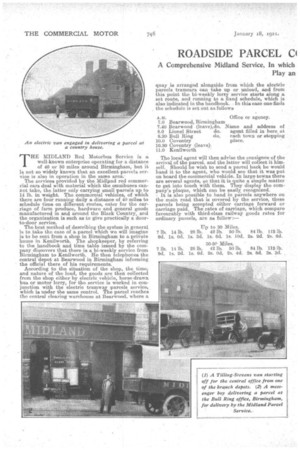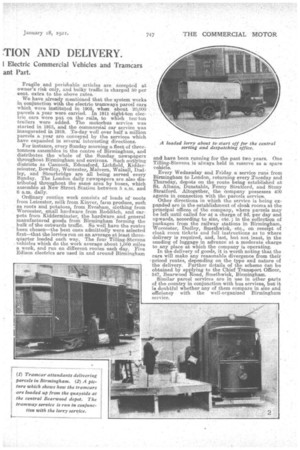• ROADSIDE PARCEL CI :TION AND DELIVERY.
Page 12

Page 13

If you've noticed an error in this article please click here to report it so we can fix it.
A Comprehensive Midland Service, In which Play an 1 Electric Commercial Vehicles and Tramcars ant Part.
An electric van engaged in delivering a parcel at a country house. THE MIDLAND Red Motorbus Service is a well-known enterprise operating for a distance of 40 or• 50 miles around Birmingham, but it is not so widely known that an excellent parcels service is also in operation in the same area.. The Services provided by the MidlAnd red commercial ears deal with material which the omnibuses cannot take, the latter only carrying small parcels up to 14 lb. in weight. The commercial vehioles, of which there are four running daily a distance of 40 miles to schedule time on different routes, cater for the carriage of farm produce, hardware and general goods manufactured in and around the Black Country, and the organization is such as to give practically a doorto-door service.
The best method of describing the system in general is to .take the ease of a parcel which we will imagine is to be sent from a shop in Birmingham to a private house in Kenilworth. 7L'he shopkeeper, by referring to the handbook and time table issued by the company discovers that there is a hi-weekly service from Birmingham to Kenilworth. He then telephones the central depot at Bearwood in Birmingham informing the official there of his requirements.
According to the situation of the shop, the time, and nature of the• load, the goods are then collected from the shop either by electric vehicle, horse-drawn bus or motor lorry, for the service is worked in conjunction with the electric tramway parcels service, which is under the same control. The parcel reaches the central clearing warehouse at Bearwood, where a quay is arranged alongside from which the electric parcels tramcars can take up or unload, and from this point the hi-weekly lorry service starts along a set route, and running to a fixed schedule, which is also indicated in the handbook. In this case one finds the schedule is set out as follows
A.M. Office or agency.
7.0 Bearwood, Birmingham
7.40 Bearwood (leave),do. Name and address of
8.0 Lionel Street do. agent filled in here at
8.30. Bull Ring do. each town or stopping
10.0 Coventry place. 10.30 Coventry (leave) 11.0 Kenilworth The local agent will then advise the eonsignee of the arrival of the parcel. and the latter will collect it him,. self. Should he wish to send a parcel back he would hand it to the agent, who would see that it was put on board the commercial vehicle. In large towns there are several agents, an that it is quite a simple matterto get into touch with them. They display the company's plaque, which can be easily recognized. It is also possible to hand in parcels anywhere on the main road that is covered by the service, these parcels being accepted either carriage forward or carriage paid. The rates of carriage, which compare favourably with third-class railway goods rates forordinary parcels, are as follow:—
Up to 30 Miles. 7 lb. 14 lb. 28 lb. 42 lb. 50 lb. 84 lb.112 lb. 9d. is. Ocl. is. 3d. is. 6c1. is. 10d. 2s. 2d. 2s. 6d.
30-50 Miles.
71b. 14th. 28 lb. 42 lb. 50 lb. 8411,. 112 lb. 9d. is. 2d. is. 6d. 2s. 0d, 2s. 4d. 2s. 8d. 3a. 3d.
Fragile and perishable articles are accepted at owner's risk only, and bulky traffic is charged 50 per cent. extra to the above rates.
We have already mentioned that the system works in conjunction with the electric tramways parcel cars which were instituted in 1905, when. about 29,000 parcels a year were carried. In 1911 eight-ton electric cars wore put on the rails, to which ten ton trailers were added. The motorbus service was started in 1913, and the commercial car service was inaugurated in 1919. To-day well ever half a million parcels a year are conveyed by the services, which have expanded in several interesting directions.
For instance, every Sunday morning a fleet of threetonners assembles in the centre of Birmingham, and distributes the whole of the Sunday newspapers throughout Birmingham and environs. Such outlying districts as Cannock, Edensford, Lichfield, Kidderminster, I3ewdley, Worcester, Malvern, Walsall, Dudley, and Stourbridge are all being served every Sunday. The London daily rewspapers are also distributed throughout the same area by buses, which assemble at New Street Station between 5 a. in. and 0 a.m. daily.
. Ordinary routine work consists of loads of 000ts from Leicester, milk from Kinver, farm produce, such as roots and potatoes, from Evesham, clothing from Worcester, small hardware from Redditch, and carpets from,Kidderminster, the hardware and general manufactured goods from Birmingham 'forming the bulk of the outwards traffic. SO well have the routes been chosen—the best ones admittedly were selected first—that the lorries run on an average at least threequarter loaded each way. The four Tilling-Stevens . vehicles which do the work average about 1,060 miles a week, and run on different routes each day: Five Edison electrics are used in and around Birmingham
and have been running for the past two years. One Tilling-Stevens is always held in reserve as a spare vehicle.
Every Wednesday and Friday a service runs from Birmingham to London, returning every Yuesday and Thursday, depots on the route being established at St. Albans, Dunstable, Fenny Stratford, and Stony Stratford. Altogether, the company possesses 400 agents in connection with the parcels service. Other directions in which the service is being expanded arc in the establishment of cloak rooms at the principal offices of the company, where parcels may be left until called for at a charge of 2d. per day and upwards, according to size, etc.; in the collection of packages from the railway stations in Birmingham, Worcester, Dudley, Smethwick, etc., on receipt of cloak room tickets and full instructions as to where delivery is required, and, last, but not least, in the sending of luggage in advance at a moderate charge to any place at which the company is operating. In the delivery of goods, it is worth noting that the cars will make any reasonable divergence from their priced routes, depending on the type and nature of the delivery. Further details of the scheme can be obtained by applying to the Chief Transport Officer, 547, Bearwood Road, Smethwick, Birmingham. Similar parcel services are in use in other parts a the country in conjunction with bus services, but it is doubtful whether any of them compare in size and efficiency • with the well-organized Birmingham service.
































